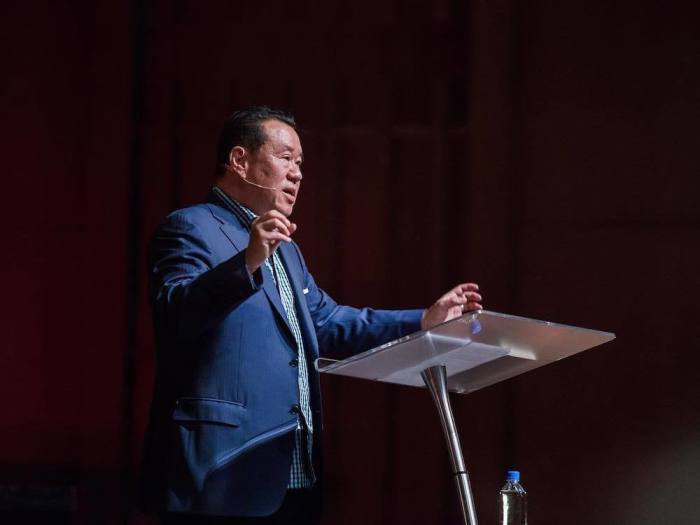California Pastor Che Ahn warns church closures rooted in Marxist ideology

A California pastor who has challenged his state government over worship restrictions and church closures in response to COVID-19 believes such restrictions are rooted in Marxist ideology.
In an interview with The Epoch Times published Saturday, Pastor Che Ahn of Harvest Rock Church in Pasadena, California, asserted that “When the pandemic happened, I think a lot of what I would call left-wing governors, you can call Democrat or liberals, but I feel they’re more left-wing, I think they seized the opportunity to really control society and one of the areas that I think they really like to control is the church because historically, the church has been the most outspoken against government control in this country.”
While many proponents of limiting the number of people who can attend in-person church services point to public health concerns as the justification for their actions, Ahn attributes the restrictions to a more sinister motive: “Marxism is a religion. Humanism is a religion. It is putting the human at the top instead of God, and so, [socialism] will do everything possible to get people to reject worshiping the true God.”
“That’s why we’re having such a battle in our nation against the values of our Founding Fathers who are mostly Christians and you know they had biblical values, Judeo-Christian values. So that’s why I feel there is an assault going on,” he asserted.
Over the past year, Ahn has found himself among several pastors clashing with the government over coronavirus worship restrictions. California implemented particularly strict restrictions on worship services during the coronavirus pandemic. The state faced criticism for not imposing similar restrictions on secular businesses, which led to some pastors to designate their churches as “strip clubs” so they could remain open during the pandemic.
In addition to limiting the number of people who could gather for in-person worship services, the state prevented people from conducting at-home Bible studies, which prompted Ahn to file a lawsuit against the state. Pastor Ahn took his challenge against the ban on all forms of in-person worship to the Ninth Circuit Court of Appeals and later to the U.S. Supreme Court, which ordered the district court to rehear the case in light of its ruling in Roman Catholic Diocese of Brooklyn v. Cuomo that struck down coronavirus worship restrictions in New York state.
In April, more than a year after the coronavirus pandemic first began to spread in the U.S., California lifted its mandatory restrictions on religious services, changing the language on capacity limits regarding worship services from “mandatory” to “highly recommended.” In response to this move, Mat Staver of Liberty Counsel, who represented Harvest Rock in its legal proceedings, expressed relief that California’s Democratic Gov. Gavin Newsom “finally dropped his draconian restrictions on churches.”
In May, the state of California was ordered to pay Harvest Rock Church $1.35 million in attorneys' fees and legal costs that the church incurred as a result of its litigation against the state. Last month, a federal judge ordered the state to pay $1.6 million in attorneys’ fees to South Bay United Pentecostal Church and an additional $550,000 to a Catholic priest who also sued the state over its worship restrictions.
At the same time, the same federal judge issued an injunction preventing Newsom and other state officials from “issuing or enforcing regulations” against churches and places of worship in response to the pandemic. Although Ahn was threatened with fines and jail time for holding in-person worship services in violation of public health orders, he maintained that he made the right decision by defying the state’s restrictions in his interview with The Epoch Times.
“Thank God that we chose to be open, defying [Newsom’s] orders because we feel strongly that the Constitution is the Supreme Law of the Land, and no one’s above the Constitution, even our president or governor, and the Constitution protects our right, not only for free speech but for us to assemble, to worship, and they will not interfere with a free exercise thereof, ” he said.
Ahn is not the only person warning about the advance of Marxism in the U.S. In a recent interview with The Christian Post, Kevin McGary, the co-founder of Every Black Life Matters, said “Marxism is really what we’re fighting on all fronts at the moment,” specifically noting its prominence in American education.
Even as churches in California no longer face the strict worship restrictions they were subject to at the beginning of the pandemic, Newsom could still face political consequences for the restrictions he imposed during the height of the pandemic. His private dinner at an upscale French restaurant, which took place as coronavirus restrictions prevented Californians from eating out, resulted in allegations of hypocrisy and accelerated the effort to recall him.
The recall campaign gathered enough signatures to force a recall election, which is scheduled to take place Sept. 14. California voters will be asked if they want to remove Newsom from office. If a majority vote to oust him, the votes for replacement candidates will be tallied. In such a scenario, the replacement candidate that receives the most votes would become governor.
The most recent poll of the recall election, conducted by Democratic pollster Change Research in June, found that 54% of California voters oppose the recall election compared to 40% who support it. However, a June poll from Republican pollster Moore Information Group found a plurality of likely voters (49%) support the recall effort and 46% oppose it. The most recent nonpartisan poll, conducted by the Public Policy Institute of California in May, found that 57% of Californians oppose the recall while 40% would vote in favor of it.
Ryan Foley is a reporter for The Christian Post. He can be reached at: ryan.foley@christianpost.com




























